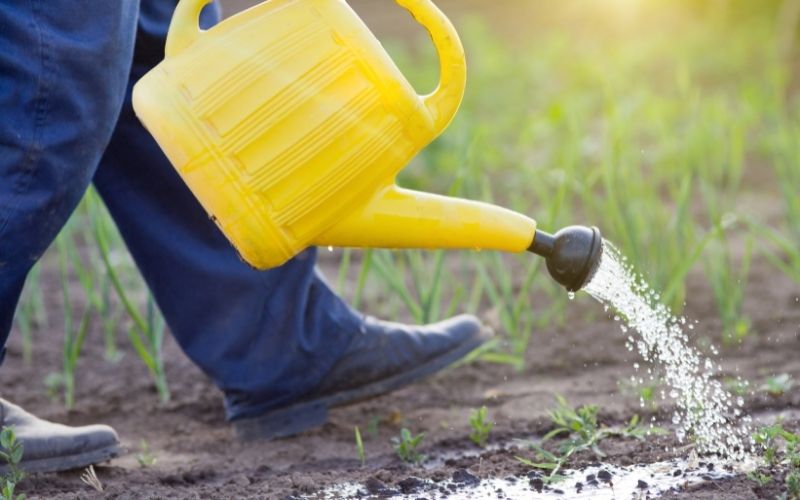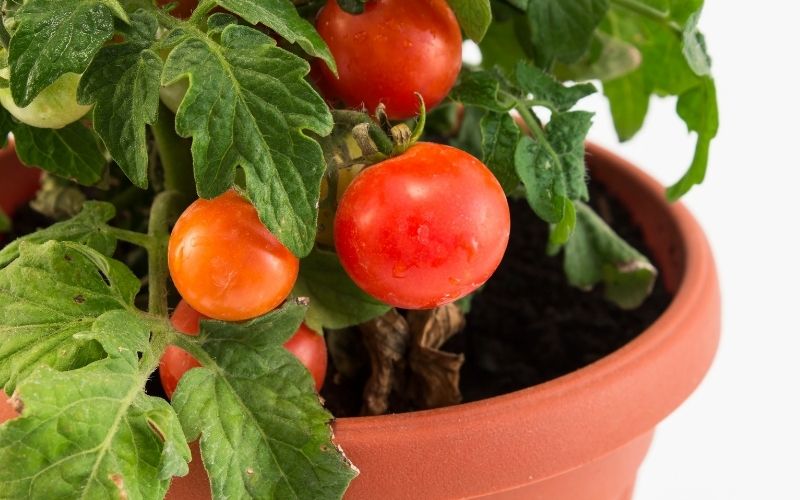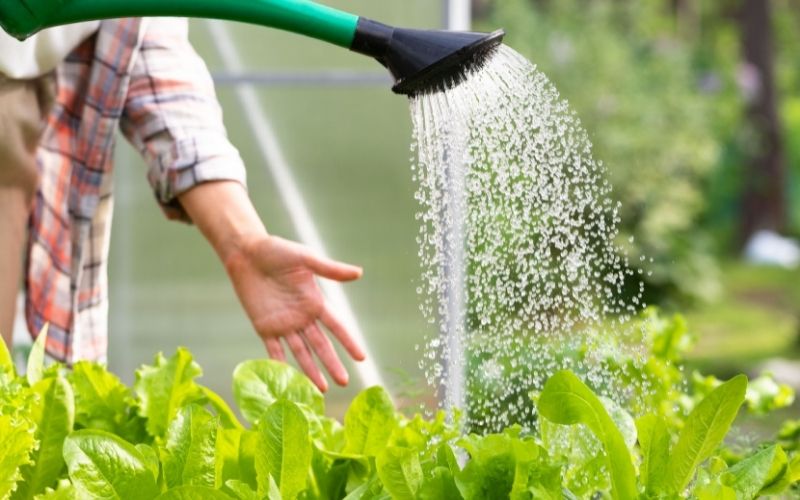Raise your hand if you’ve forgotten to water your vegetable garden until the leaves were all dry, and brown, and you had destroyed any chance of seeing any harvestable vegetables. We’ve all been guilty of this at some point. Let’s face it – despite how much you care about your vegetable garden, there will always be something else that’s much more important and urgent.
Unfortunately, not watering your vegetable garden often enough can not only kill your plants but can also kill your motivation to keep on growing vegetables. Watering regularly is extremely important to keep your vegetable plants healthy, keep them producing, and keep pests and diseases away. Despite this, watering your garden regularly requires some effort and can become just another annoying item on your to-do list that gets pushed back.
This post is about 5 strategies that you can easily implement to keep your vegetable garden properly watered. Some of these strategies will make it less likely that you will forget to water your vegetable plants while the others will reduce how often you will need to water.
1. Strategically locate your vegetable garden

The location of your vegetable garden has a big impact on how successful your vegetable garden will be. Not only will you need to locate it in a place where all the needs of your vegetable plants are met as best as possible, but it also has to be somewhere easily accessible to you. The more often you are to go near your vegetable garden the less likely you are to forget to care for it.
Locating your vegetable garden very close to home, somewhere along the pathway to a gate or just outside a door that you open regularly, is helpful. When you have to see your vegetable plants every day, you will also be able to more likely to water your plants even if you are very busy and have just a few minutes to spare.
If you don’t have a suitable location for an in-ground or raised bed vegetable garden, you can try to implement #5 below.
2. Mulch

One of the best benefits of mulching your vegetable garden is that you will need to water your vegetable garden less often. This is because the ground cover created by mulching reduces the amount of water that evaporates. This means that your plants will be able to use most of the water temporarily stored in the soil layer that has their roots.
Mulching will also help your vegetable garden in a variety of other ways.
3. Water deeply

Vegetable plants that have already established themselves in the ground need on average an inch of water a week. You can water your plants deeply by providing your plants with all the water that they need for the week all at once.
Watering deeply will allow you to water your plants just once a week on a day that you are not too busy unless the weather is really hot and more frequent watering is needed. This will make it less likely that you forget to water. Watering deeply will also help your plants develop stronger roots by having to grow deep into the soil to get the water and nutrients they need.
Find out more about how to deeply water your vegetable garden.
The combined effect of adding mulch and watering deeply will also create a root zone that is moist and can support a high diversity of beneficial soil organisms, which include good bacteria, fungi, and earthworms.
4. Make spending time in your vegetable garden a habit

The best time to water your vegetable garden is early in the morning before the sun comes up. This is because evaporation is low and gives your plants a chance to take up as much water as they need. Watering early in the morning will also help your plant roots completely dry up by night preventing any harmful diseases or pests from establishing.
There’s nothing quite like having a lovely garden to greet you early in the morning. Not only is it a good practice to check your vegetable plants at least once a day so that you identify any problems before they get out of hand, but time spent in nature is also beneficial for our mental health as well.
If you can spend just 10 minutes in your vegetable garden part of your morning routine you can use that time to check if your plants need to be watered and water them as well. Making this a habit will almost guarantee that you will not forget to water your vegetable garden.
5. Grow vegetables in containers

If you notice that you are less likely to go out of your house and water your plants, you may want to grow vegetables in containers and place the containers near your house or on a balcony. This will allow you to water your plants while you attend to other household tasks.
If your day’s work makes it hard for you to water your plants in the morning, growing vegetables in containers will give you an opportunity to water your plants after your day’s work is done during the early evening, which is the next best time to water your vegetable plants.
Nevertheless, you should be aware that container gardens need to be watered more frequently, usually once a day, compared with an in-ground vegetable garden that usually needs to be watered just once or twice a week. This means that you need to weigh out the other advantages and disadvantages of growing vegetables in containers to decide on whether this option is right for you.
Forgetting to water your vegetable garden regularly can be devastating but can happen to anyone. To make it less likely that you forget to water, you can strategically locate your garden and reduce the frequency of watering needed by mulching and deep watering. You can also make watering your vegetable garden a habit by incorporating it into your morning routine. If on the other hand, you need a more flexible approach, you may want to consider growing your vegetables in containers, if you find it more suitable for you.

